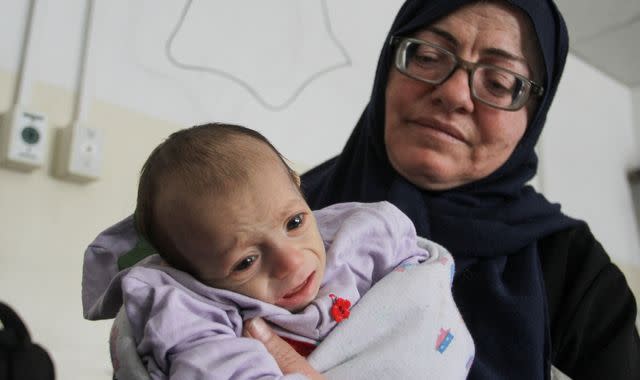Gaza: Starving children and adults dying the 'size of a skeleton', says World Food Programme boss

Starving children and adults in Gaza are dying after being reduced to the "size of a skeleton", according to the World Food Programme boss.
Cindy McCain, executive director of the UN agency, said her staff describe it as "a complete disaster" and there are serious problems getting trucks in safely and in sufficient numbers.
Israel's offensive following the Hamas attack on 7 October has displaced much of Gaza's population, many of whom are fleeing again as Israel escalates attacks in the southern city of Rafah.
Hundreds of thousands are starving and desperate, and Mrs McCain told Sky News the reality is devastating.
She told Yalda Hakim: "Imagine a child wasting into the size of a skeleton - and of course passing from it - and an adult doing the same thing. That's what we're seeing on the ground.
"If we could get in now we might be able to fend off a hardcore famine, but we're not there yet and we're not getting in."
Mrs McCain urged Israeli authorities to help her agency get "full access" to Gaza - and "at scale" - so they can try to meet the huge demand for food.
She said trucks that do manage to get access often have to deal with chaotic circumstances.
"An inability to get in or a miscommunication - wherever it came from - and we're stuck at a checkpoint, and by the time the sun comes up people figure out we're there and they loot the entire convoy.
"I'm not faulting them for looting - they're hungry - and we should be able to get in in a way that's at scale and unfettered."
Mrs McCain added: "Some days we can go in and the checkpoint's here, then they say 'no, you can't go that way' - when we were cleared to go that way - then we have to go back out.
"So it's a combination of all kinds of confusion - it's a warzone, so you have miscommunications everywhere."
The WFP boss told Yalda Hakim children were "taking the brunt" of the dire situation in Gaza and that she faces agonising decisions on where to allocate supplies.
"[I'm] having to make the decision - because of a lack of funding - about taking food from the hungry and giving it to the starving, and where I do that from," said Mrs McCain.
"Those are decisions I make every day and that keeps me awake at night."
The UN says around 600,000 people have left Rafah since Israel last week began its controversial ground offensive - which it says is vital to destroy Hamas cells and rescue hostages.
Israel has provided other areas for people to move to, away from the fighting, but Mrs McCain said they were being "pushed into a smaller areas" - with ensuing problems for sanitation, and food, water and medicine supplies.
Read more:
Eyewitness: Israeli protesters block aid going into Gaza
South Africa says war at 'horrific stage' as it appeals to court
Satellite images show speed and scale of Rafah evacuation
On Thursday, the US military completed the docking of a floating pier designed to get more aid into Gaza.
Mrs McCain welcomed the move and said her agency would help "manage and distribute" supplies with other organisations.
But she said it's vital land crossings are open and free-flowing if the agency is to make a big difference to the crisis.
"The way to get food in at scale is by road and we've not been able to do that at scale," she said.
Israel has blamed UN agencies for not distributing aid more efficiently and creating backlogs of supplies.
It's also consistently said it takes great care to avoid civilian casualties, but Hamas deliberately embeds itself with the population.
The WFP chief said a ceasefire would make a significant difference to delivering aid in greater quantities, as well as more safely.
However, ongoing mediated efforts to broker another truce have so far proved unsuccessful.
Gaza's health ministry says more than 35,000 people have died so far in the seven-month war, while about 1,200 were murdered in the 7 October Hamas attack that triggered Israel's offensive.
Several hundred Israelis were also taken hostage, with immense pressure at home for the government to agree a deal to free them.


